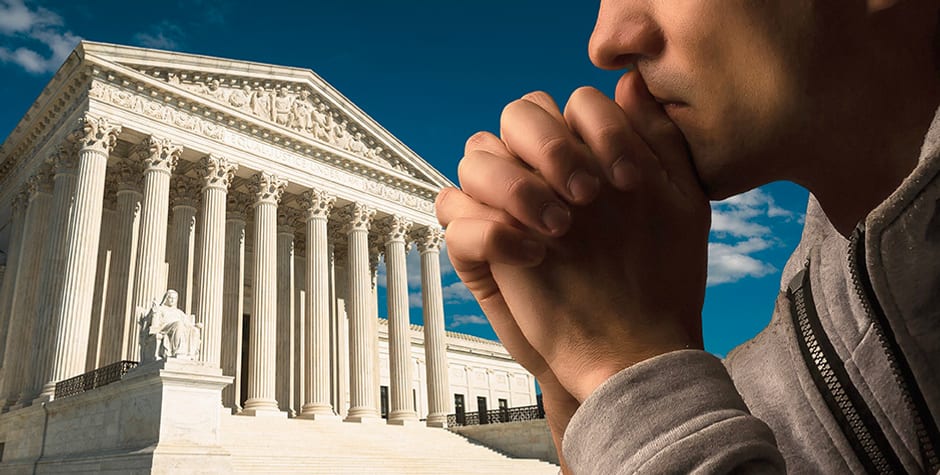ACLJ Files Brief With Supreme Court Defending Religious Liberty and a Football Coach's Right To Pray Privately After Games
Recently, the American Center for Law and Justice (ACLJ) filed an amicus brief with the Supreme Court of the United States in a major religious liberty case. In Kennedy v. Bremerton School District, a school fired Coach Joe Kennedy because he said a brief, quiet prayer of gratitude after football games.
As we explained earlier, Coach Kennedy was the assistant coach of the Bremerton High School football team. For seven years, Coach Kennedy would wait until the players cleared the field, then he would kneel in the middle of the field and pray SILENTLY for 15-30 seconds. There was never a complaint from his players, fellow coaches, or the parents.
Nevertheless, Bremerton school officials eventually ordered Coach Kennedy to stop praying. The school claims it was worried that Kennedy’s prayers could be perceived as the school’s endorsement of religion in violation of the Establishment Clause under Supreme Court case law. When Coach Kennedy requested a religious exemption to continue his tradition of praying after the games, the school district summarily implemented a sweeping new ban prohibiting all employees from engaging in any “demonstrative religious activity,” either silently or audibly, when on-duty and within view of a student or the public.
The district court and the Court of Appeals for the Ninth Circuit agreed with the school district, holding that Kennedy’s firing was justified by the Establishment Clause. Thus, the lower courts essentially ruled that the Establishment Clause trumped Coach Kennedy’s First Amendment rights to free speech and the free exercise of his religious faith.
While there are many reasons why the Ninth Circuit’s decision should be reversed, a core problem is the Supreme Court’s Establishment Clause decisions themselves. The Court’s interpretation of the Clause has been a muddled mess over the past 50 years. Many of the Court’s earlier decisions, in particular, reflect a separationist approach that is very much at odds with what the Founding Fathers intended when the Establishment Clause was adopted.
The Founders never intended the Establishment Clause to forbid government “endorsement” of religion. To the contrary, endorsement of religion occurs in the Declaration of Independence, the annual Thanksgiving days, which date back to our first President, George Washington, and in numerous other ways.
One of the Court’s worst landmark decisions is that of Lemon v. Kurtzman. Decided a half century ago, the Lemon decision is truly a lemon. It’s the most egregiously wrong Establishment Clause decision that the Court ever issued.
Our brief, therefore, argued that it is time for the Supreme Court to overrule Lemon v. Kurtzman. To its credit, the Court has not invoked Lemon in any of its Establishment Clause cases in many years. Instead, the Court has decided cases recently that are much more consistent with the original meaning of the Establishment Clause. For example, as we explained here, the Supreme Court adopted a “history and tradition test” in American Legion v. American Humanist Ass’n.
Lower courts must look at history and tradition when considering whether a practice (like public school football coaches praying silently) is challenged under the Establishment Clause. Had the Ninth Circuit applied the history and tradition test, it could not possibly have concluded that Coach Kennedy’s prayers constituted an establishment of religion. As we explain in our brief, religion and education were closely linked at the founding, and “Religious education was therefore widespread, and often supported by public funds.”
The American Legion decision also repudiated Lemon. But the Court stopped short of overruling Lemon. Perhaps the Justices thought formal repudiation was enough. But it clearly was not.
Rather than follow the American Legion decision and apply the history and tradition test, the lower courts, including the Ninth Circuit, still continue to apply Lemon v. Kurtzman. Our brief urges the Supreme Court to overrule Lemon. Failure to do so will mean that lower courts will continue to use Lemon to justify infringing the free speech and free exercise rights of students and teachers in the public schools.
As we explained in our brief:
While many federal judges recognize that Lemon is truly dead, multiple cases have applied Lemon since American Legion was decided. Expressly abandoning Lemon was not enough. Overruling Lemon is necessary to restore principled adjudication to the lower federal courts’ Establishment Clause jurisprudence. . . .
There is no reason to retain Lemon, least of all the doctrine of stare decisis. As evidenced by nearly a half century of often scathing criticism from scholars, members of this Court, and lower court judges, Lemon is poorly reasoned. Its foundational flaw, of course, is that it is untethered to the original meaning of the Establishment Clause. Devoid of sound doctrinal underpinnings, Lemon is elastic and unprincipled. The addition of the anti-historical endorsement inquiry made matters worse because the ever malleable “objective observer” standard promotes wildly inconsistent results.
Oral argument will be heard in the case later this spring.
With your ongoing support, we will continue to fight for the rights of teachers and students to exercise their free speech and religious liberty rights in public schools.
